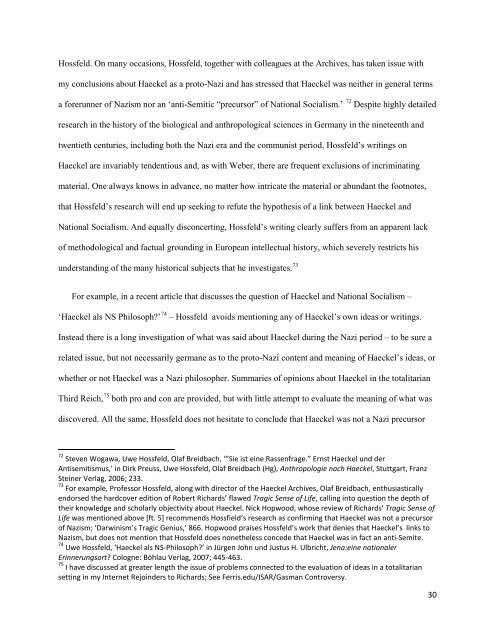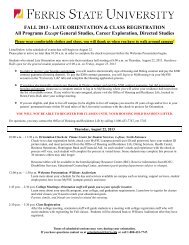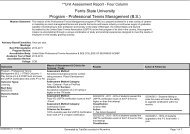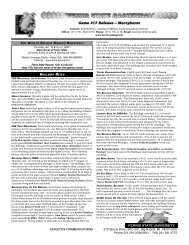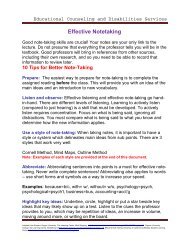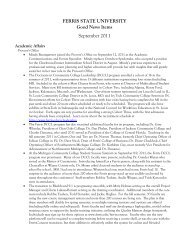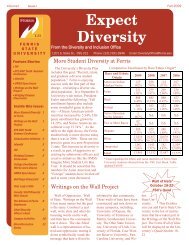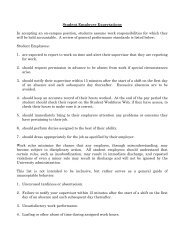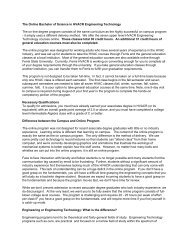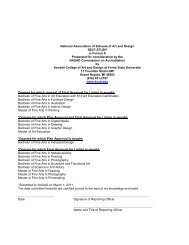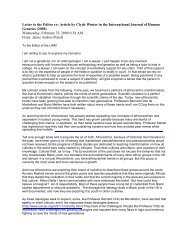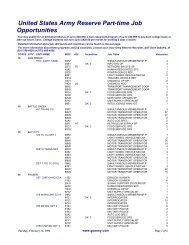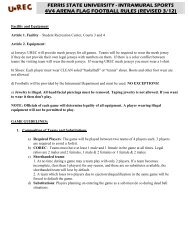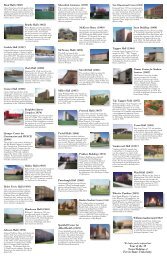Daniel Gasman - Ferris State University
Daniel Gasman - Ferris State University
Daniel Gasman - Ferris State University
You also want an ePaper? Increase the reach of your titles
YUMPU automatically turns print PDFs into web optimized ePapers that Google loves.
Hossfeld. On many occasions, Hossfeld, together with colleagues at the Archives, has taken issue with<br />
my conclusions about Haeckel as a proto-Nazi and has stressed that Haeckel was neither in general terms<br />
a forerunner of Nazism nor an ‘anti-Semitic “precursor” of National Socialism.’ 72 Despite highly detailed<br />
research in the history of the biological and anthropological sciences in Germany in the nineteenth and<br />
twentieth centuries, including both the Nazi era and the communist period, Hossfeld’s writings on<br />
Haeckel are invariably tendentious and, as with Weber, there are frequent exclusions of incriminating<br />
material. One always knows in advance, no matter how intricate the material or abundant the footnotes,<br />
that Hossfeld’s research will end up seeking to refute the hypothesis of a link between Haeckel and<br />
National Socialism. And equally disconcerting, Hossfeld’s writing clearly suffers from an apparent lack<br />
of methodological and factual grounding in European intellectual history, which severely restricts his<br />
understanding of the many historical subjects that he investigates. 73<br />
For example, in a recent article that discusses the question of Haeckel and National Socialism –<br />
74<br />
‘Haeckel als NS Philosoph?’ – Hossfeld avoids mentioning any of Haeckel’s own ideas or writings.<br />
Instead there is a long investigation of what was said about Haeckel during the Nazi period – to be sure a<br />
related issue, but not necessarily germane as to the proto-Nazi content and meaning of Haeckel’s ideas, or<br />
whether or not Haeckel was a Nazi philosopher. Summaries of opinions about Haeckel in the totalitarian<br />
Third Reich, 75<br />
both pro and con are provided, but with little attempt to evaluate the meaning of what was<br />
discovered. All the same, Hossfeld does not hesitate to conclude that Haeckel was not a Nazi precursor<br />
72 Steven Wogawa, Uwe Hossfeld, Olaf Breidbach, ‘”Sie ist eine Rassenfrage.” Ernst Haeckel und der<br />
Antisemitismus,’ in Dirk Preuss, Uwe Hossfeld, Olaf Breidbach (Hg), Anthropologie nach Haeckel, Stuttgart, Franz<br />
Steiner Verlag, 2006; 233.<br />
73<br />
For example, Professor Hossfeld, along with director of the Haeckel Archives, Olaf Breidbach, enthusiastically<br />
endorsed the hardcover edition of Robert Richards’ flawed Tragic Sense of Life, calling into question the depth of<br />
their knowledge and scholarly objectivity about Haeckel. Nick Hopwood, whose review of Richards’ Tragic Sense of<br />
Life was mentioned above [ft. 5] recommends Hossfield’s research as confirming that Haeckel was not a precursor<br />
of Nazism; ‘Darwinism’s Tragic Genius,’ 866. Hopwood praises Hossfeld’s work that denies that Haeckel’s links to<br />
Nazism, but does not mention that Hossfeld does nonetheless concede that Haeckel was in fact an anti-Semite.<br />
74<br />
Uwe Hossfeld, ‘Haeckel als NS-Philosoph?’ in Jürgen John und Justus H. Ulbricht, Jena:eine nationaler<br />
Erinnerungsort? Cologne: Böhlau Verlag, 2007; 445-463.<br />
75<br />
I have discussed at greater length the issue of problems connected to the evaluation of ideas in a totalitarian<br />
setting in my Internet Rejoinders to Richards; See <strong>Ferris</strong>.edu/ISAR/<strong>Gasman</strong> Controversy.<br />
30


